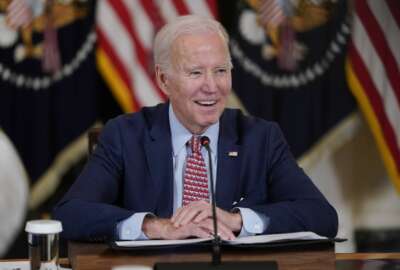The White House is directing agencies to deepen and expand their interactions with the public on regulatory activities, with a specific focus on increasing proactive engagements with affected communities and using the Unified Agenda to broadcast public participation opportunities.
In a memo released today, the White House Office of Information and Regulatory Affairs details specific action agencies should take to improve public participation and community engagement when developing regulations.
“It is crucial for federal agencies to craft regulatory proposals with input from affected members of the public,” OIRA Administrator Richard Revesz writes in the memo.
White House officials point to a range of regulatory issues that rely on public input, including increasing access to affordable medicine, setting workplace safety standards, reducing toxic chemical exposure, and rules affecting small businesses and entrepreneurs.
In a blog post, Sam Berger, associate administrator of OIRA, writes the actions laid out today are intended to “make it easier for interested members of the public to voice their views in the regulatory process.”
“Hearing from those who are directly affected by a regulation or care about a specific issue helps ensure that we’re addressing the most pressing concerns of communities throughout the country,” Berger writes.
The directive provides more clarity for agencies on how they can carry out some aspects of an April executive order from President Joe Biden on “modernizing regulatory review.”
In today’s memo, Revesz cites research showing agencies are most likely to hear from “larger, established, and well-resourced organizations with deep knowledge of the regulatory process.”
Meanwhile, the general public, especially underserved communities, face multiple barriers, Revesz continues, including a lack of awareness around forthcoming agency actions; a “lack of resources or incentives” to participate in traditional regulatory processes; and further obstacles, including language barriers, physical accessibility, and Internet access.
Revesz specifically directs agencies to use the biannual Unified Agenda to “publicize past, ongoing, and future public participation and community engagement activities.”
The Unified Agenda is updated by OIRA every spring and fall, respectively, providing a central place where the public can track regulatory actions across government. While agencies use it to provide brief updates on those actions, the agenda typically provides little or no information on how the public can get involved in the process.
“Agencies can use this existing regulatory planning process as an opportunity to expand public awareness about agency participation and engagement efforts, including engagement of underserved communities,” Revesz writes.
Agencies should begin making changes to their agenda entries for publication in the fall 2023 Unified Agenda, his memo states.
But the “application of these changes will take time,” it continues, and agencies “may initially apply this guidance to a smaller subset of regulations and regulatory priorities, and scale up over time as agencies and their components develop further capacity and experience with implementation.”
Revesz also encourages agencies to be more proactive about engaging with communities by reviewing policies around informal communications with the public, known as “ex parte” communications in rulemaking parlance.
Agency policies should favor “early engagement and transparency,” Revesz writes.
“Agency ex parte communications policies should support proactive outreach by the agency, especially prior to issuing an individual proposed rule when doing so would result in fairer and more equitable treatment,” he continues.
OIRA encourages agencies to publish a regulatory engagement plan on their websites that meets best practices outlined by the Administrative Conference of the United States, such as defining how the agency will work with affected communities and detailing a designated point of contact at the agency for questions on regulatory issues.
Revesz also directs agencies to consider taking full advantage of exemptions and flexibilities in the Paperwork Reduction Act, which requires agencies to have certain information collection activities approved by OIRA.
“OIRA heard from agencies and members of the public that the PRA can be perceived as an obstacle to timely engagement in the regulatory process,” his memo states.
But Revesz “reaffirms” that many best practices for public engagement, such as holding open-ended public listening sessions in advance of making regulatory decisions, are exempt from reviews under the law.
“In addition, even when regulatory engagement activities involve PRA review, OIRA already has flexibilities in place that can simplify and expedite the PRA review process. OIRA encourages agencies to consult with their OIRA desk officers to understand the full range of relevant exclusions and flexibilities,” Revesz writes.
OIRA focused on ‘time tax’
Today’s memo follows a July 10 report from OIRA detailing the Biden administration’s efforts over the past year to reduce the “time tax” levied on the public by complicated and confusing government paperwork and processes.
The report notes that in one case, an individual commented to OIRA during a public listening session that the experience of filling out disability insurance benefits forms was, “more frightening than having cancer — twice.”
Berger recently noted that his office’s initiatives are focused on reducing burdens under the Paperwork Reduction Act to individuals accessing government services and benefits, ranging from Social Security benefits to farm loans.
“Traditionally, people have thought of that as sort of applying to the forms that businesses might fill out when they’re doing a range of things, but it should equally apply to people when they’re trying to get access to government services, access to a benefit that they’re eligible for,” Berger said during an interview airing on Friday, July 21, on the Federal Drive with Tom Temin.
“And the point of this effort is to say, ‘We need to be doing a better job here, we need to be focused on these issues, we need to be thinking about those burdens. And then we need to be looking for ways to reduce them,’” Berger continued.
And feedback from the public, he said, is crucial to OIRA’s goals to reduce paperwork burdens and other government process problems.
“A big part of this is hearing from the American people, understanding where there are issues and where there can be improvements,” he said. “And so I would just encourage folks, when you see these opportunities for public participation, participate, because they really do make a difference. When people say that this is a real problem, there’s someone out there who’s going to be looking at that and trying to figure out how to fix it.”
Copyright
© 2024 Federal News Network. All rights reserved. This website is not intended for users located within the European Economic Area.





